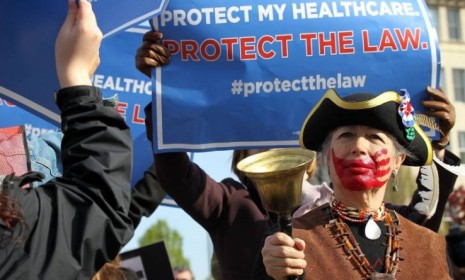5 possible outcomes of the Supreme Court's ObamaCare decision
After months of fevered speculation, the Supreme Court will finally weigh in on President Obama's health care overhaul on Thursday

A free daily email with the biggest news stories of the day – and the best features from TheWeek.com
You are now subscribed
Your newsletter sign-up was successful
The Supreme Court handed down several big, consequential decisions on Monday — just not the one most of the U.S. political world is awaiting. The high court's ruling on ObamaCare will almost certainly arrive on Thursday, ending months of suspense and setting into motion an unpredictable series of political and perhaps even policy dominoes. But "when the verdict does come, don't be surprised if the outcome and implications are not instantly clear," cautions Jonathan Cohn at The New Republic. There are likely to be various opinions and dissents joined by different justices, leaving a whole range of possible outcomes. Here's a look at some of the most likely scenarios, plus some of the less-likely possibilities:
1. The Supreme Court upholds the entire law
Policy-wise, this is the clearest scenario. And "if you believe in health care reform, as I do, this is obviously the best outcome," says Cohn. It is also, despite all the tea-leaf reading, "a very credible" possibility — "two very conservative judges at the appellate level found the law to be constitutional," after all. If you don't like the law, there would be room for hope, too, says Deirdre Walsh at CNN. Upholding ObamaCare, GOP aides and strategists privately acknowledge, would jolt the GOP base and give the party "a cleaner election-year message": The only way to slay ObamaCare is to put Republicans in control of the House, Senate, and White House.
The Week
Escape your echo chamber. Get the facts behind the news, plus analysis from multiple perspectives.

Sign up for The Week's Free Newsletters
From our morning news briefing to a weekly Good News Newsletter, get the best of The Week delivered directly to your inbox.
From our morning news briefing to a weekly Good News Newsletter, get the best of The Week delivered directly to your inbox.
2. The justices strike down just the individual mandate
The individual mandate — the focus of the court challenge — is by far the most unpopular part of the law. It requires most Americans without employer-sponsored health insurance to buy it, often with government subsidies, or pay a fine. Killing just the mandate would be "a moral victory for critics" of Obama and his health care law, says Cohn, but would "probably do very little damage to the law itself." It's "the worst-case scenario for insurance companies," though, say Brent Kendall and Peter Landers at The Wall Street Journal. If Congress didn't act, insurers would have to accept all-comers, regardless of age or pre-existing conditions, and people could wait until they're sick to sign up, leading to "chaos in the market."
3. The mandate and other provisions are overturned
The Obama administration itself argued that if the individual mandate goes, at least two other provisions should, too, says Stephanie Condon at CBS News. Those parts of the law — the ones requiring insurers to cover everyone who asks, and charge them the same rates regardless of age — are "nearly twice as popular" with the public as the mandate. If the court strikes down these three parts, "it would mean that the principal aim of the law — expanding coverage to tens of millions of Americans — would be unlikely to be achieved," say Kendall and Landers. And "Republicans would feel vindicated and push to repeal the rest of the law."
A free daily email with the biggest news stories of the day – and the best features from TheWeek.com
4. The court throws out the entire law
"This is as bad as it sounds," or at least as chaotic, saysCohn. Some 30 million people "lose health insurance they were supposed to get," the federal deficit would go up, and the baked-in incentives to improve the health care system disappear. This option would also "unravel all the work by the health industry and local governments preparing for the law," say Kendall and Landers. It would be "a painful blow" to Obama and his party, but it would "also put pressure on Republicans" to come up with viable solutions of their own.
5. The wild-card rulings
Most legal analysts consider this scenario unlikely, says Condon, but the Supreme Court could punt, saying it can't rule on the individual mandate until it takes effect in 2014. In this case, ObamaCare "could be argued in 2015, once someone has actually paid a fine." The justices could also "make a ruling on one part of the law and then 'remand' the case to a lower court to sort out the rest," says Cohn. Although none of these permutations are likely, remember, "this is the Supreme Court. The justices can do pretty much what they want."
Read more political coverage at The Week's 2012 Election Center.